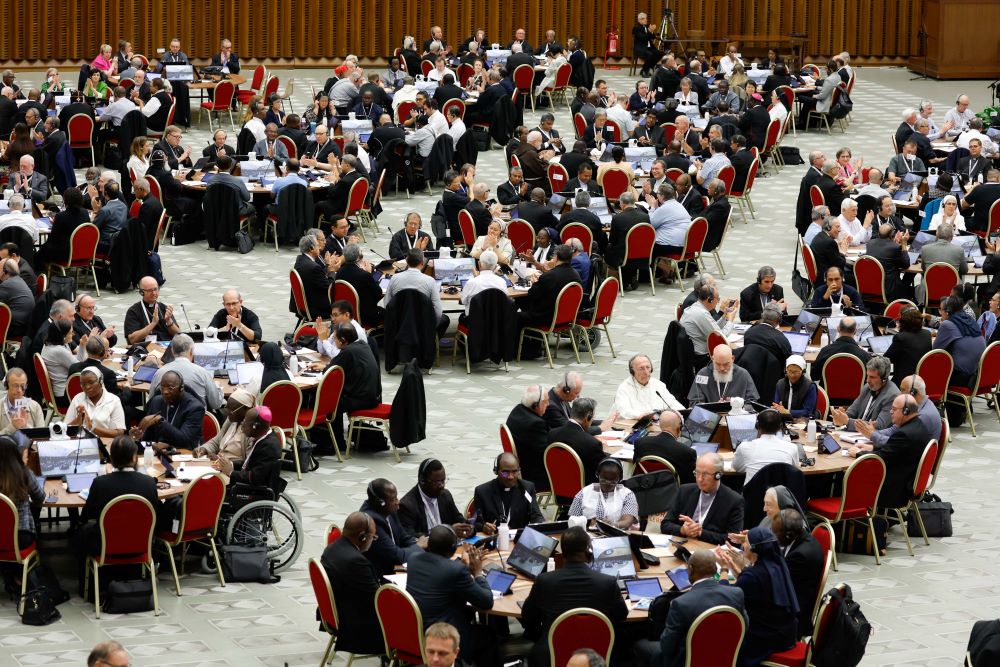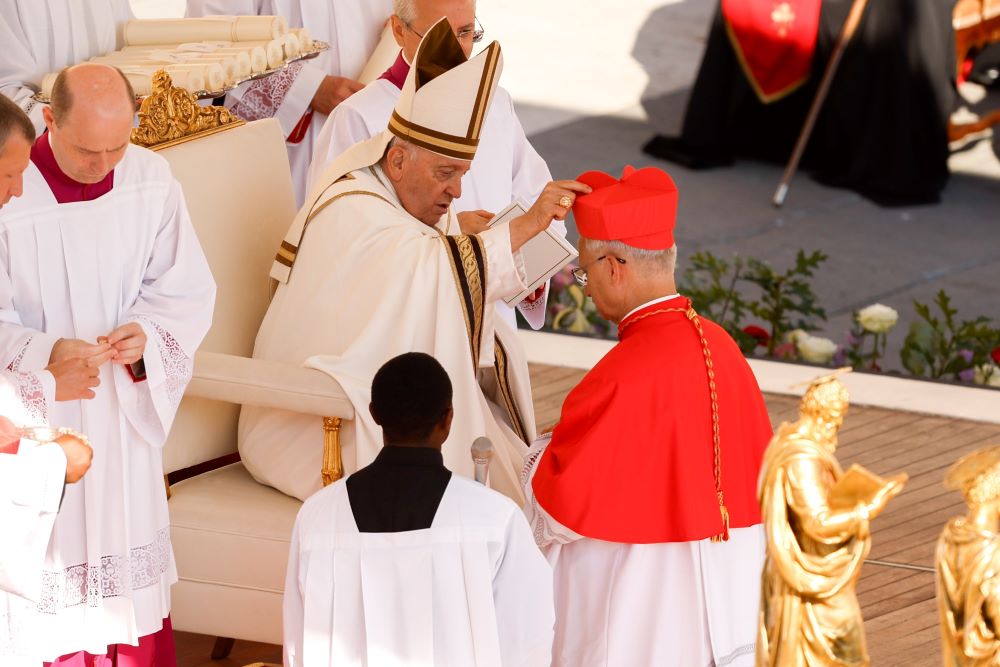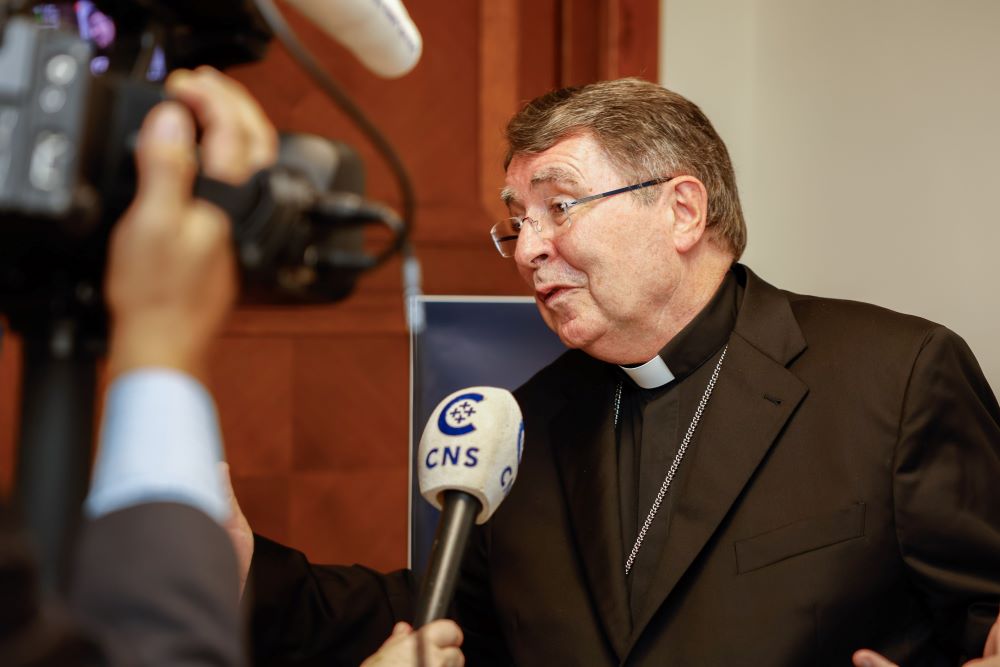
Members of the assembly of the Synod of Bishops start a working session in the Vatican's Paul VI Audience Hall Oct. 18. (CNS/Lola Gomez)
The life of the Catholic Church in 2024 is filled with forks in the road, most of them placed there by our reforming pontiff, Pope Francis. As the pope pushes ahead with his effort to recall the church to Gospel basics — God's redeeming mercy and grace, concern for the poor and the outcast, holiness and catholicity — American Catholics are faced with a well-financed, well-organized opposition for whom "the basics" are a series of culture war issues.
Synodality has emerged as the leading vehicle for ecclesial reform and the preparations for the second session of the synod, as well as the synod itself in October, will dominate the year. Those preparations got a belated start. Generally, the synod organizers have done a great job but it was shocking that, at the synod's close, they had no instructions ready for the local churches to follow up and prepare for this year's gathering. Over a month later, on Dec. 12, the synod office made public a document that encouraged "further consultation" at the local level, with the synthesis document used as a "reference point."
By then, of course, the worldwide media attention the synod had generated in October was largely dissipated.
We will see how much "further consultation" actually occurs. Will dioceses that barely engaged the synodal process now step up to the plate? Will bishops lead synodal discussions about some of the issues identified in the synthesis document? It will be especially interesting to see if bishops engage the important discussion about formation, especially the formation of seminarians. Will pastoral councils become more effective? Will discussions about the role of women become serious or remain formulaic? Will legal artifacts like corporation sole, which vests all church property in the person of the bishop, be discarded for more synodal arrangements?
We are also beginning to learn more about what transpired at the first session of the synod, and it will be interesting to see how the preparations for the second session confront the problems that emerged or, in true Bergoglian fashion, allow the tensions to continue to percolate. For example, while no one will go on the record, after speaking with many participants, it's clear there were tensions between the theologians and the bishops according to several synod attendees, with different people assigning different reasons for the tensions. Some blame the theologians, saying they wanted to run the show and were not permitted to do so. Others suggest the leadership experts who undertook many of the tasks of facilitation had undue influence over the proceedings.
And, of course, there were tensions between demographic groups, with bishops from the Global South resisting some of the proposals for greater acceptance of gay and lesbian Catholics that European and North American bishops proposed.

Pope Francis gives the red biretta to new Cardinal Robert Prevost, the U.S.-born prefect of the Dicastery for Bishops, during a consistory for the creation of 21 new cardinals in St. Peter's Square at the Vatican in this file photo from Sept. 30. (CNS/Lola Gomez)
It remains to be seen how these tensions will play out at the local level during this period of consultation. How many bishops have reached out to theologians to explore the issues raised in the synthesis document? How many pastors have read the synthesis document? Whatever one thinks of this issue or that, has the synodal process begun to take root?
Synodality is one way Pope Francis will be reshaping the universal church. Personnel appointments is another. Nowhere is this more important than in the selection of new cardinals who not only serve as key advisers to the pope but also become leaders in their home countries. And, with the pope having turned 87, naming new cardinals takes on the added quality of shaping the selection of the next pope.
In January, Cardinal John Onaiyekan of Abuja, Nigeria, turns 80 and will lose his right to vote in the next papal conclave. In February, Cardinal Pedro Baretto Jimeno, the archbishop of Huancayo, Peru, and Cardinal Jose Lacunza Maestrojuán of Panama will turn 80 and lose their votes. Ten more cardinals will age out of the conclave in 2024, including Cardinal Sean O'Malley of Boston, who was seen as a papal contender last time. That will bring the total number of cardinal electors down to 121, one more than the informal limit of 120. Will Francis hold another consistory? Or will he wait until 2025 when even more cardinals age out?
Speaking of Boston, O'Malley submitted his resignation when he turned 75, but the Holy Father kept him on as archbishop. So far, the pope has not allowed diocesan bishops to serve past 80. so we can expect a new archbishop in Boston sometime this year. Detroit and Cincinnati are also due for new archbishops, their incumbents having turned 75 last year. Archbishop Thomas Rodi of Mobile and Milwaukee Archbishop Jerome Listecki both turn 75 in March, as does Houston's Cardinal Daniel DiNardo in May. Kansas City's Archbishop Joseph Naumann and Omaha's Archbishop George Lucas hit the retirement age in June, and Archbishop Gregory Aymond of New Orleans turns 75 in November. They will all submit their resignations as required by canon law.
Also, mark April 12 on your calendar: That is the date on which Archbishop Leonard Blair of Hartford, most famous for leading the investigation of the Leadership Conference of Women Religious, turns 75 and his coadjutor Archbishop Christopher Coyne will assume the reins.
Each of the nine new appointments to metropolitan sees is its own fork in the road. In each, the pope has the opportunity to choose men who agree with his reforms. In each, time is flying by. Those charged with processing appointments need to expedite the process and name some new leaders. Throw long. Take chances.
The essential fault line in the Catholic Church in this country runs between those who support Pope Francis' missionary approach and those who resist it. In an interview with America magazine, Cardinal Christophe Pierre explained how "astounded" he was when he arrived in the U.S. in 2016 that "many of the bishops didn't know what had happened in Aparecida. They did not know that Evangelii Gaudium, the first document of Pope Francis, was rooted in Aparecida."
Later in the interview Pierre added, "I would not concentrate on Francis so much because Francis is now seen as the big sinner by some. There are some priests and religious and bishops who are terribly against Francis as if he was the scapegoat [for] all the failures of the church or of society."
This did not sit well with the U.S. Catholics who have resisted the pope's reform efforts. Archbishop Timothy Broglio, president of the U.S. Conference of Catholic Bishops, said at a press conference, "So I think there might be a little bit of a dichotomy between what was presented in that article and what the reality is. That's my perception. He's open to his opinion, and I'm open to mine." This kind of casual dismissal of important and informed criticism, choosing not to engage Francis' reform, can be expected to continue.

Then Cardinal-designate Christophe Pierre, nuncio to the United States since 2016, talks with a CNS reporter at the Vatican. Sept. 29. He was elevated to cardinal the next day. (CNS/Lola Gomez)
Tim Busch, founder of the Napa Institute, an organization for conservative plutocrats, took to the pages of National Review to rebut the nuncio. Busch did not suggest the U.S. church look to Aparecida and the lessons from Latin America. I wonder if Busch consulted Napa's "ecclesiastical adviser," Archbishop Paul Coakley, the secretary of the USCCB and archbishop of Oklahoma City, about his rebuttal?
Instead, Busch argued that "Global Catholicism could learn a lot from the U.S. example of empowering everyday Catholics to preach the gospel." He pointed to the lay apostolates in the country, many of which offer a highly conservative version of Catholicism, a theme he has sounded before, as my colleague Tom Roberts reported previously. Busch said he thinks the fact these lay groups (he mentioned Legatus as well as Napa) have access to capital is a good thing, not a hindrance, which is one way of looking at it. No "poor church for the poor" for him.
Busch also has previously argued that the U.S. church, or at least the business school at Catholic University that bears his name and the Napa Institute itself, could serve as a model for the rest of the church when it comes to Catholic social teaching. "We can be the teaching pulpit for the American church, but also the teaching pulpit for the Vatican and for the global church," he told a 2017 conference at CUA. "We can be that. And we will be that going forward, especially on the issues and topics of business." The only problem is that Busch is hostile to most of what Catholic social teaching has to say about economics. His pernicious influence with large swaths of wealthy Catholics and the bishops who hang out with them will continue.
The inability of the U.S. church to place Catholic social teaching at the heart of its public witness remains a scandal. Will 2024 see any real effort to confront climate change by the nation's bishops? Will we defend the dignity of migrants with the same fervor that we defend the dignity of the unborn? Will we promote a more equitable, and less laissez faire, economy?
It is not just social teachings that provide another fork in the road. There have emerged two ways of responding to the pope's continuing call to help people meet Jesus before we start beating them over the head with the catechism, with a heavy emphasis on sexual sins. This is the real issue at the heart of the controversy occasioned by the publication of Fiducia supplicans, the Vatican's recent document on giving blessings to people in irregular marital situations. That document did not alter one iota of Catholic doctrine. It merely helped to explain that a priest can give blessings to people for all sorts of reasons and in all sorts of contexts, that invoking grace can only help people, and that every human relationship has something of worth and value.
From the reaction, you would have thought the pope was advocating free love. Many bishops issued statements explaining precisely what the document does and doesn't say. Others, as they have in the past, place the most uncharitable interpretation on anything that issues from this pontificate. Unsurprisingly, the latter chorus was led by the former Archbishop of Philadelphia Charles Chaput. "Confusion among the faithful can often be a matter of innocent individuals who hear but fail to understand the Word. Confused teaching, however, is another matter. It's never excusable," he ranted in First Things. He complained, "Deliberate or persistent ambiguity—anything that fuels misunderstanding or seems to leave an opening for objectively sinful behavior—is not of God." Nice.
Sadly, Chaput was not alone. "We have received a number of inquiries from the faithful concerning Fiducia Supplicans, a Vatican document published Monday on the topic of blessings," according to a joint statement by the two Catholic bishops in South Dakota. "It specifically discusses the offering of a blessing by a priest to persons living in situations of unrepentant serious sin, such as same-sex sexual relationships, fornication, or adultery." Nice.
Chaput and his ilk have refused to receive the teaching of Amoris Laetitia, Pope Francis' 2016 apostolic exhortation following the twin synods on the family. It was during those synods that I dubbed Chaput the captain of Team Javert: "Those who falter and those who fail, must pay the price" sums up their moral outlook. I do not anticipate any lessening in their criticism of the pope in 2024.
Advertisement
On the other hand, plenty of bishops in this country have embraced the pope's vision and do so wholeheartedly. Consider the statement about Fiducia Supplicans from Las Vegas Archbishop George Leo Thomas. "Our Holy Father Pope Francis has long shown his pastoral concern for the salvation of souls and his closeness to people in every situation, including those who are struggling spiritually, or alienated from the Church," his statement began. "His writings, instructions, homilies, and indeed his very life, demonstrate his desire to minister to all people, especially those who are most in need of God's mercy and grace." He went on to explain the declaration in the same generous manner it was intended. Is there anything in Thomas' statement that is "not of God"?
Other areas of church life will continue to fascinate even if they are less likely to dominate the headlines. Catholic higher education has enormous opportunities to shape public discourse, as I discussed in the wake of congressional testimony by three presidents of secular universities turned into a trainwreck. The charitable arms of the church will continue to do what they can to address the problems of homelessness, the plight of migrants and others in need. The deeper challenge of preaching the Gospel in an affluent society will be noticeable mainly for its absence from most Catholic pulpits.
So, 2024 promises to bring continued polarization within the U.S. church. But maybe, just maybe, the weight will begin to shift among the hierarchy from those who oppose the pope to those who embrace him, from those who follow Francis at the various forks in the road and those who take the alternate path, from Team Javert to Team Valjean. At any rate, these are the stories I anticipate covering in the coming year.








